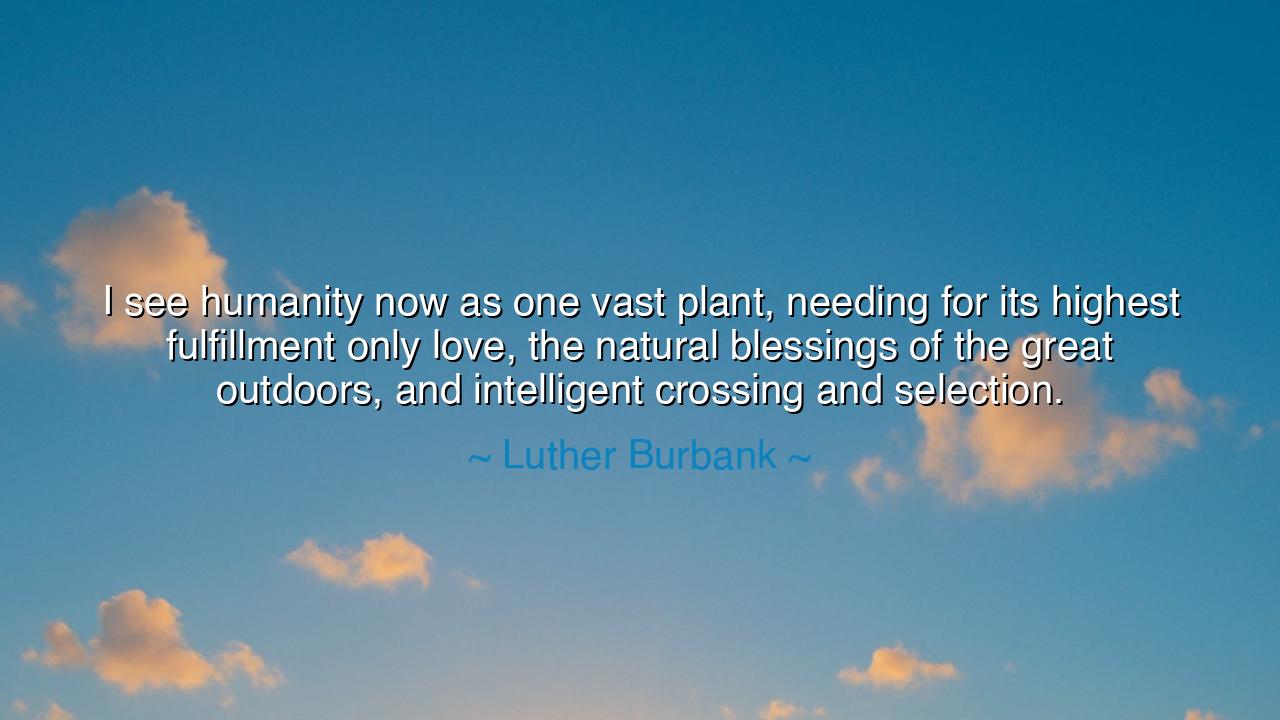
I see humanity now as one vast plant, needing for its highest
I see humanity now as one vast plant, needing for its highest fulfillment only love, the natural blessings of the great outdoors, and intelligent crossing and selection.






When Luther Burbank wrote, “I see humanity now as one vast plant, needing for its highest fulfillment only love, the natural blessings of the great outdoors, and intelligent crossing and selection,” he was not merely speaking as a botanist but as a philosopher of life. His words bloom from the soil of both science and spirit. For Burbank, who devoted his life to cultivating plants that nourished mankind, saw in the garden a mirror of the human race. Just as plants require sunlight, care, and selective cultivation to reach their full beauty, so too does humanity need love, the nurturing embrace of nature, and the wise guidance of knowledge and discernment.
In the ancient way of understanding, Burbank’s metaphor is not of flowers but of civilization itself. The Earth, he suggests, is one vast field, and mankind its growing vine. Love is the sunlight that warms it, nature the soil that sustains it, and intelligent selection—the thoughtful shaping of character and culture—the gardener’s hand that prunes and directs its growth. Without these, the plant of humanity grows wild, choking itself in weeds of greed, ignorance, and hatred. But tended with wisdom, it bears fruit fit for generations. In these words lies a harmony between science and virtue, between evolution and enlightenment.
Burbank spoke from the age of discovery, when man’s hand was learning to shape life itself. As a horticulturalist, he created new species of fruits and flowers—symbols of potential unlocked through care and experiment. Yet even as he reshaped nature, he warned that progress must be guided by compassion. He saw that love was the great fertilizer of both soil and soul. Just as a neglected garden withers, so too does a loveless humanity fall into decay. Love, to Burbank, was not sentiment, but the very energy of life—the force that allows growth, connection, and renewal. Without it, all other advancements become sterile.
History provides a vivid echo of this truth. Think of Ashoka the Great, the ancient emperor of India. Once a conqueror drenched in blood, he turned toward compassion and truth after witnessing the suffering his wars caused. From that turning came an empire rooted in peace, justice, and tolerance—nourished not by conquest but by love and wisdom. Like Burbank’s vision, Ashoka learned that the highest cultivation of humanity does not come through domination but through nurturing the inner garden—the moral and spiritual soil of civilization.
Yet Burbank also understood that love alone is not enough. Just as a garden must be cultivated with care, so must society be shaped by intelligence and discernment. “Intelligent crossing and selection” in his words refers not to the arrogance of control, but the humility of learning from nature’s laws. He believed in progress born from observation and harmony, not exploitation. Humanity must learn, as he did, to improve itself through the cross-pollination of ideas, cultures, and experiences. Diversity, when guided by understanding, produces beauty; when ignored, it withers into division.
There is deep wisdom here for our modern age. In a world rushing with technology yet starving for tenderness, Burbank’s words remind us that progress without love is barren, and love without knowledge is blind. The true gardener of the human spirit is one who blends both—the heart of compassion and the mind of reason. To build a better humanity, we must nurture both the soil of empathy and the seed of intellect, for only together can they yield the harvest of peace.
So let this teaching be passed like a seed through generations: cultivate your soul as Burbank cultivated his fields. Tend your thoughts with care, prune away envy and prejudice, and let your roots reach deeply into the soil of kindness. Surround yourself with nature, for in her presence, the human heart remembers its origin. And above all, seek intelligent love—that sacred union of warmth and wisdom that allows both the Earth and the human race to bloom in their fullest splendor. For as Burbank taught, when humanity becomes one vast plant nourished by love and guided by truth, the garden of the world shall never cease to flower.






AAdministratorAdministrator
Welcome, honored guests. Please leave a comment, we will respond soon